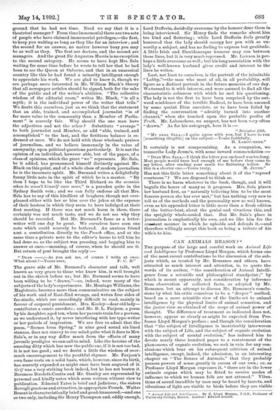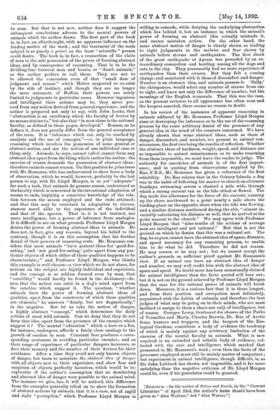CAN ANIMALS REASON P*
THE purpose of the large and careful work on Animal Life and Intelligence by Professor Lloyd Morgan, which forms one of the most recent contributions to the discussion of the sub- jects which, as treated by Mr. Romanes and others, have attracted so much interest and attention, is, to quote the words of its author, "the consideration of Animal Intelli- gence from a scientific and philosophical standpoint ;" by which is meant apparently, not consideration by inference from observation of collected facts, as adopted by Mr. Romance, but an attempt to discuss Mr. Romanes's conclu- sions by what his critic conceives to be a " deeper " method, based on a more scientific view of the limits set to animal intelligence by the physical limits of animal sensation, and the juster view so obtained of the scope of animal power of thought. The difference of treatment so indicated does not, however, appear so clearly as might be expected from Pro- fessor Lloyd Morgan's preface ; and though the consideration that "the subject of Intelligence is inextricably interwoven with the subject of Life, and the subject of organic evolution with the subject of mental evolution," has induced him to devote nearly three hundred pages to a restatement of the phenomena of organic evolution, we seek in vain for any con- clusions which bear on his subsequent criticism of animal intelligence, except, indeed, the admission, in an interesting chapter on "The Senses of Animals," that they probably possess powers of sense greatly in excess of our own ; or, as Professor Lloyd Morgan expresses it, "there are in the lower animals organs which may be fitted to receive modes of influence to which we human folk are not attuned." Vibra- tions of sound inaudible by man may be heard by insects, and vibrations of light are visible to birds before they are visible • Animal Life and Intelligence. By 0. Lloyd Morgan, F.G.S., Professor of University College, Bristol. London : Edward Arnold. to man. But that is not new, neither does it suggest the subsequent conclusions adverse to the mental powers of animals which the author draws. The first part of the book is, in fact, an afterthought, with no apparent influence on the leading motive of the work ; and the treatment of the main subject is as purely a priori as the least " scientific " person could desire. The book is, in fact, a reassertion of the claim of man to the sole possession of the power of forming abstract ideas, and by consequence of reasoning. That is to be the dividing-line between man and beasts, or "dumb animals," as the author prefers to call them. They are not to be allowed the concession even of that "small dose of judgment and reason" which Huber suspected to co-exist by the side of instinct, and though they are no longer the mere automata of Buffon, their powers are solely limited to judgments in particular cases. However ingenious and intelligent their actions may be, they never pro- ceed from any notion derived from general experience; and the author is prepared not only to say, with John Locke, that abstraction is an excellency which the faculty of brutes by no means attains to," but also that "in man alone is the rational faculty, as defined in these pages, developed." Reason, as be defines it, does not greatly differ from the general acceptance of the term. It is "inference which can only be reached by analysis and the use of concepts,"—or, in plain language, reasoning which involves the possession of some general or abstract notion, and not the notion of one individual case or thing only. Animals, he says, cannot reflect, cannot form any abstract idea apart from the thing which excites the notion : the exercise of reason demands the possession of abstract ideas : therefore animals cannot reason. On this position he joins issue with Mr. Romanes, who has endeavoured to show from a body of observation, which he would, however, probably be the last person to say, with Dr. Lloyd Morgan, is as yet " adequate " for such a task, that animals do possess reason, understood as the faculty which is concerned in the intentional adaptation of means to ends, implying a conscious knowledge of the rela- tion between the means employed and the ends attained; and that this may be exercised in adaptation to circum- stances novel alike to the experience of the individual and that of the species. That is, it is not instinct, nor mere intelligence, but a power of inference from analogies. It is difficult to see on what grounds Professor Lloyd Morgan denies the power of forming abstract ideas to animals. He does not, in fact, give any reasons, beyond his belief to the contrary, though it is on this assumption that his further denial of their powers of reasoning rests. Mr. Romanes con- siders that most animals "have general ideas for good-for. eating,' and not good-for-eating,' quite apart from any par- ticular objects of which either of these qualities happens to be characteristic ; " and Professor Lloyd Morgan, who thinks this example is well chosen—a view which we do not share, for notions on the subject arc highly individual and capricious, and the concept is so seldom formed even by man, that eatability " would hardly be found in the dictionary—de- nies that the notion can exist in a dog's mind apart from the eatables which suggest it. The question, "whether animals have the power of forming abstract ideas of qualities, apart from the constructs of which these qualities are elements," he answers "firmly, but not dogmatically," in the negative. But let us take the notion of danger, a highly abstract "concept," which determines the daily actions of most wild animals. Can we deny that they do not form that idea, apart from the presence of the enemies which suggest it ? The mental " education " which a hare or a fox, for instance, undergoes, affords a fairly close analogy to the growth of caution in man. Constant fear produces a corre- sponding acuteness in avoiding particular enemies; and as their range of experience of particular dangers increases, so does their memory and the number of their devices for their avoidance. After a time they avoid not only known objects of danger, but learn to associate the abstract idea of danger with all objects new to their experience, and show fear and suspicion of objects perfectly harmless, which would be in- explicable if the author's assumption that no dominating and abstract idea of danger were possible to the animal mind. The instance we give, has, it will be noticed, this difference from the examples generally relied on to show the formation of abstract notions by animals, that it is a ease, not of rapid and right "perception," which Professor Lloyd Morgan is willing to concede, while denying the underlying abstraction which lies behind it, but an instance in which the animal's power of forming an abstract idea actually misleads it, and causes mistaken action. On the other hand, the same abstract notion of danger is clearly shown as leading to right judgments in the malaise and fear shown by animals before storms and earthquakes. The first shock of the great earthquake at Agram was preceded by an ex- traordinary commotion and howling among all the dogs and cats in the city. They presumably had no more experience of earthquakes than their owners. But they felt a coming change, and associated with it ideas of discomfort and danger. Number is an abstract idea, and animals possess it. Sally,' the chimpanzee, would select any number of straws from one to eight, and knew not only the difference of number, but the meanings of the English numerals. That this was the case, as the present reviewer to all appearance has often seen and the keepers asserted, there seems no reason to doubt.
in his review of the instances of apparent reasoning in animals adduced by Mr. Romanes, Professor Lloyd Morgan aims at destroying the inference as to the use of the reasoning process by the same arbitrary denial of the presence of any general idea in the mind of the creature concerned. We have already shown that some abstract ideas, such as those of danger, discomfort, and number, are present to animal con- sciousness, the first two being the results of reflection. Whether the abstract ideas of hardness, weight, speed, and distance are so impossible to animal consciousness as to make reasoning from them impossible, we must leave the reader to judge. The authority for anecdotes of animals is of the first import- ance; and in quoting from observations supplied by Dr. Rae, F.R.S., Mr. Romanes has given a reference of the first reliability. Dr. Rae relates that in the Orkney Islands, a dog was in the habit of following his master to church on alternate Sundays, swimming across a channel a mile wide, through which a strong current ran as the tide ebbed or flowed. The dog made due allowance for the force of the current, running up the shore northward to a point neatly a mile above the landing-place on the opposite shore when the tide was flowing, and a similar distance southward during the ebb, "almost in- variably calculating his distance so well, that he arrived at the point nearest to the church." We may agree with Professor Lloyd Morgan that "nine-tenths of the actions of average men are intelligent and not rational." But that is not the ground on which he denies that this was a rational act. The dog, he argues, cannot have the abstract idea of space, distance, and speed necessary for any reasoning process, to enable him to do what he did. Therefore he did not reason. He may reason or he may not ; but we cannot accept the author's grounds as sufficient proof against Mr. Romanes's view. If an animal can have an abstract idea of danger and number, we may well credit him with the abstract idea of space and speed. No doubt more has been occasionally claimed for animal intelligence than the facts quoted will bear out; but it is not on the ground selected by Professor Lloyd Morgan that the case for the rational power of animals will break down. Moreover, it is a carious fact that it is those longest, and from their position and occupation most intimately, acquainted with the habits of animals, and therefore the best judges of what may be going on in their minds, who are most inclined to assign to them a share not only of intelligence, bat of reason. Georges Leroy, lieutenant des Acmes of the Parks of Versailles and Marly, Charles Darwin, Dr. Rae of Arctic fame, bunters and trappers, and the keepers of the Zoo- logical Gardens, contribute a body of evidence the tendency of which is mainly against any arbitrary limitation of the exercise of the mental faculty in animals. What is now required is an extended and reliable body of evidence, col- lected with the care and intelligence which marked that presented in Mr. Romanes's work; even then the facts of the processes employed must still be mainly matter of conjecture ; but experiment in animal intelligence, though difficult, is, as Sir John Lubbock has shown, not impossible, and is far more satisfying than the negative criticism of Dr. Lloyd Morgan could be, even if his postulates could be granted.







































 Previous page
Previous page